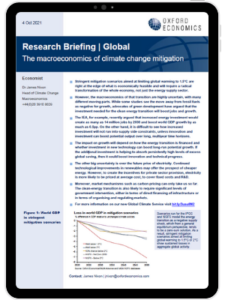The macroeconomics of climate change mitigation

Stringent mitigation scenarios aimed at limiting global warming to 1.5°C are right at the edge of what is economically feasible and will require a radical transformation of the whole economy, not just the energy supply sector.
However, the macroeconomics of that transition are highly uncertain, with many different moving parts. While some studies see the move away from fossil fuels as negative for growth, advocates of green development have argued that the investment needed for the clean energy transition will boost jobs and growth.
What you will learn:
- The impact on growth will depend on how the energy transition is financed and whether investment in new technology can boost long-run potential growth.
- The other big uncertainty is over the future price of electricity. Continued technological improvements in renewables may offer the prospect of cheaper energy.
- Moreover, market mechanisms such as carbon pricing can only take us so far. The clean-energy transition is also likely to require significant levels of government intervention.
Tags:
Related Services

Post
Stopgap Spring Statement leaves problems unresolved
The Spring Statement delivered on Wednesday 26 March is likely to prove a stopgap ahead of a more comprehensive overhaul of UK fiscal policy in this autumn's Budget.
Find Out More
Post
Europe’s defence splurge will help industry – but by how much?
Our baseline forecast now assumes that European defence spending will rise to 3% of GDP by the end of the decade. This could give a growth boost to Europe's ailing industrial sector.
Find Out More